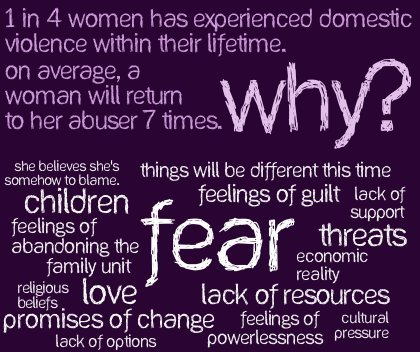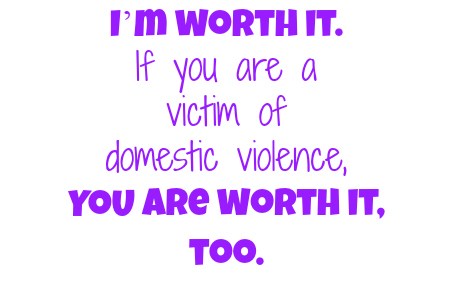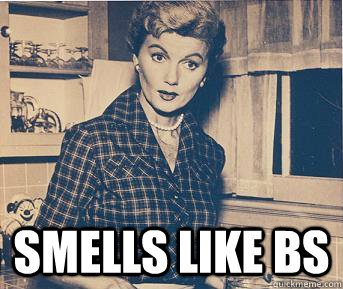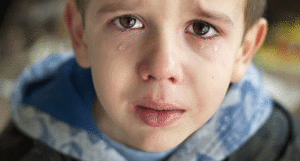
October is Domestic Violence Awareness Month. Rather than give statistics and a pep talk about “zero tolerance”, I thought I’d talk about the elephant in the room. The victim who keeps going back.
If you know anyone who is impacted by domestic violence (and I hope you don’t, but it’s likely you do), you have undoubtedly experienced the sense of helplessness that smothers friends and family of the abused. You may have helped intervene. Maybe you’ve provided a safe place. You may have been there during the humiliating physical exams, police reports, or court proceedings seeking protection. You’ve likely wiped tears and listened to hours of sobbing, reinforcing that it wasn’t the victim’s fault. You’ve put on soothing smiles while trying to distract children who have seen too much, heard too much, and can’t quite understand what they’re afraid of.

The one thing you can’t do, can’t comprehend, can’t accept, is why she goes back. After multiple instances, it’s difficult to remain supportive. Out of frustration and fear, the victim’s strongest supporters become her biggest critics.
I’ve spent a significant amount of time trying to educate myself on the dynamics that keep the cycle in motion. When you’re outside looking in, the choice is so crystal clear. When you’re in the maelstrom, it’s not so easy. If you love someone who is in an abusive situation, you have experienced the massive relief, bordering on euphoria, when the victim reaches out for help because they are “done”. You cheer them on as they stand their ground and take steps to move on with their life. She finally sees herself as others see her: smart, capable, and so deserving of a better life. You commit to doing whatever she needs to get a clean start, and you mean it.
It may last a day, a week, a month, 3 months, but you can feel it when she starts to slip. Her anger and fear is replaced with the anxiety of starting over. She loses the fire that made her take those steps out the door. She is tired. Then you sense the danger is returning: the victim stops talking about the future, communication starts to wane, and pretty soon you realize it’s all back to square one. She backs away from the people who have supported her initial decision to leave, and surrounds herself with the enablers who are congratulating her for her commitment to her relationship.
It’s hard to accept. Most people just hold their breath and wait for the next time. Some people sever the relationship with the victim because they don’t want to be part of it any longer. Many deride the victim for the decision, creating an even bigger obstacle for them to seek help the next time.
It seems insane. So, why does she do it?
She stays for the kids. While it seems insane to people on the outside looking in, she thinks the downside of not having their father around is worse than the occasional outburst. She doesn’t want him putting the kids in the middle, or, worse, making the kids feel sorry for him because Mommy got him in trouble. She knows that no matter how poor of a father he may be, if she leaves him, he’ll be worse. She doesn’t want them to be abandoned. She doesn’t want them to have a series of new step-mommies, because she knows he won’t be alone for long. Abusers need to have that relationship to get their fix.
She stays out of sympathy. Most abusers have enablers around them. Friends, family, people that have never held the abuser accountable for his actions. These people work overtime trying to appeal to the victim. They’ll give her updates about how sorry he is. Convey messages, letters, gifts, even in the face of violating restraining orders. Why? Like her, they believe his lies. They believe he’s learned his lesson, and is so sorry, and will never ever ever do this again. He likely plies them with manipulative lies: “Don’t tell her, but I haven’t slept in 4 days because I can’t stop thinking about her.” The victim, too, may have developed a co-dependent relationship with the abuser. Codependent relationships may stink to high heaven, but they’re as comfortable as an old pair of slippers.
She stays out of fear. Whether the threats have been against her, the kids, her family, or himself, she believes he’s capable of following through. The risk is just too great.
She stays because of ego. This is a tough one to acknowledge, but it’s true. When the cycle hits the part where he is begging, pleading, promising, saying all the right things, it’s pretty powerful. He can’t go on without her. Life without her is meaningless. What woman doesn’t want to feel that adored? Of course it’s bull hockey, because if it were true, the pain he caused her the very first time he abused her mentally, emotionally, or physically would have crushed him to the point that he would have immediately gotten the help he needed to never let it happen again.
She stays for security. The abuser may hold all the cards financially. He may threaten to take the children away if she leaves. The truth is, after living in an abusive relationship, it is likely many of the positives in the victim’s life have faded away: self esteem, friends, family, career. The victim may not feel capable. She may not feel worthy. She may be dealing with depression. She may be afraid of being alone.
She stays out of shame and embarrassment. The first time, there’s some hope that the abuser really means it when he says “I’m sorry.” The second time, there’s usually a harsher ultimatum, and the apology is more profuse. If the victim seems really serious, the abuser pulls out some deep dark secret that explains the abusive tendencies, and swears to get help. As the cycle repeats itself, the victim is humiliated that she ignored the advice from her supporters that was likely hurled at her endlessly every time she went back. Now, she just feels stupid: she fell for it again.
She stays because she’s invested. Forty percent of women who leave an abusive situation will return. On average, women leave seven times before leaving for good. Why? The investment theory is a classical analysis that is often used to explain why people do what is so clearly not in their best interest. Simply put, what has already been invested into the relationship, be it emotional, social and/or financial, can be incredibly hard psychologically to give up. It may seem infinitely easier to stay in a bad situation then to muster the energy and make a change. This explains why people stay: In jobs they hate, cities with no opportunities, with the wrong circle of friends or in an abusive relationship. Where we are may not be good, but it seems easier to coast along rather than put in the considerable effort needed to make a change.
She stays because she loves him. There may have been happy times, and hope is a powerful thing. However, this response is typically just a combination of all the other reasons listed. Of course she loves him, or did at one point, but a genuine love would encourage the victim to stand firm so that the abuser could get healthy. Statistics show that if she stays, the chances of the abuser actually learning how to stop the abusive behavior are abysmally low.

So what do you do? There’s no right answer, but the decision should be based on what is healthiest for YOU rather than what the victim’s situation is. You may cross your fingers and wait for the next time the dysfunction spills over into violence. You may choose to maintain a relationship with the victim, but not the abuser. You may decide you need a break from all of it, and step away for a time. You may have to accept that if the victim goes back, it is with the agreement that she will stay away from you. Abusers don’t like the people that try to help the victim leave the situation, and will try to convince the victim that their supporters are causing problems in the relationship.
Even if you have to keep your distance for awhile, it’s important that the victim knows that people love her, care about her well being, and that there are resources available to her if she needs them. Unconditional love is the best thing you can offer.
**While I have used “he” for the abuser, and “she” for the victim, that is only for clarity of communication. Victims and abusers come in all genders, colors, and religions.**
The National Domestic Violence Hotline is 1-800-799-SAFE





